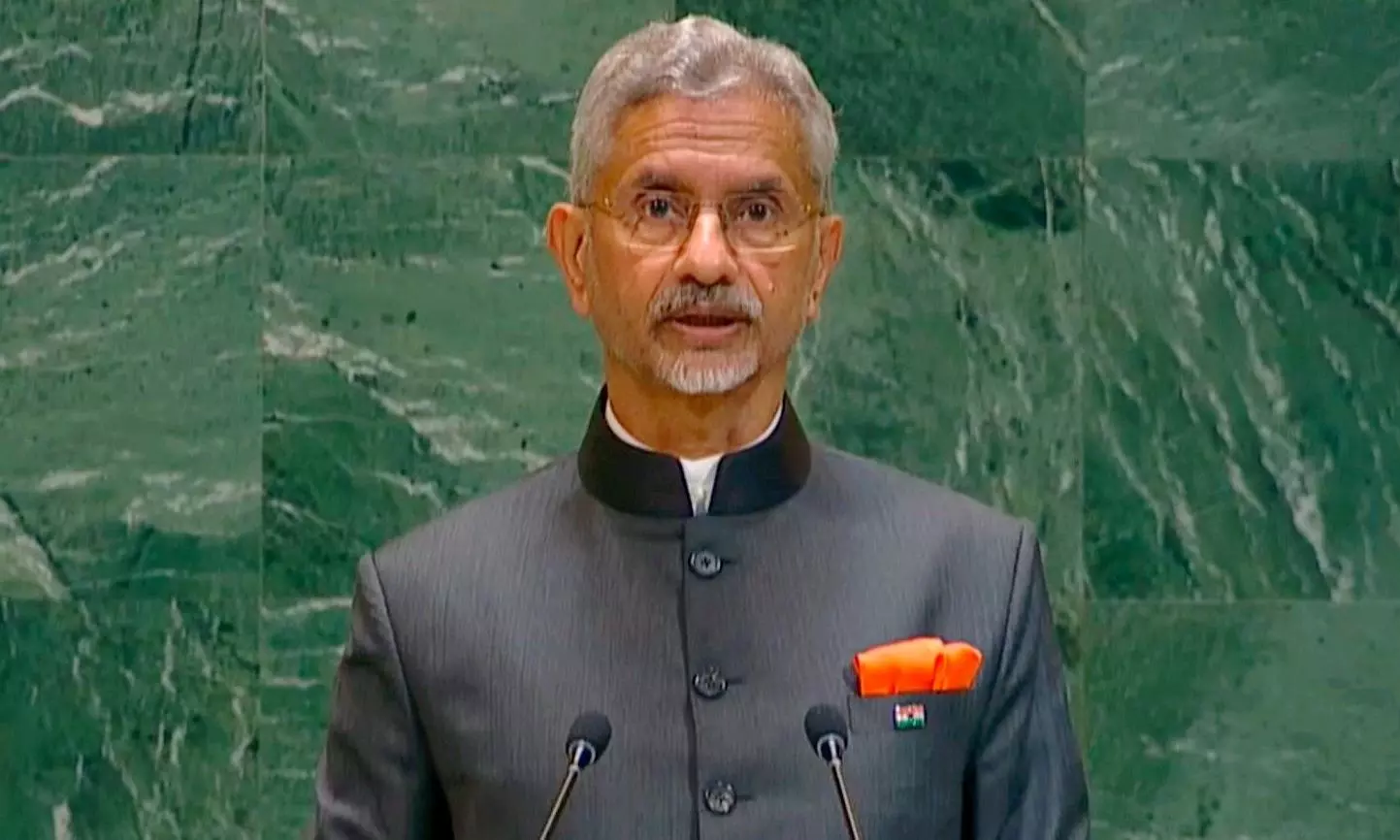
External Affairs Minister S Jaishankar speaks at the General Debate of the 80th session of the United Nations General Assembly, in New York, USA, on September 27, 2025. Photo: @unitednations via PTI Photo
Jaishankar at UNGA: India brought Pahalgam terror perpetrators to justice
EAM calls Pakistan the ‘epicentre of global terrorism’ and warns nations that condone terror will be bitten back

A day after Indian diplomat Petal Gahlot blasted Pakistani Prime Minister Shehbaz Sharif at the United Nations (UN) over his remarks targeting India at the 80th session of the UN General Assembly (UNGA), External Affairs Minister S Jaishankar said New Delhi exercised its right to defend its people against terrorism and brought perpetrators of the Pahalgam terror attack in April to justice.
In a strong address to the General Debate of the UNGA session, he also took a dig at Pakistan, calling it the “epicentre of global terrorism”.
Delivering a message against terrorism, the top diplomat warned that those who condone nations that support terror will find that it comes back to “bite them”.
Also read: ‘Hindutva-driven extremism poses danger to world’: Pakistan PM at UN
He said that while asserting its rights, India must also firmly face up to threats, and added that countering terrorism is a particular priority because it "synthesises bigotry, violence, intolerance and fear".
'Neighbour that is epicentre of terrorism'
Jaishankar, who began his address to world leaders from the UNGA podium with the salutation “Namaskar from the people of Bharat,” said, “India has confronted this challenge since independence, having a neighbour that is an epicentre of global terrorism.”
While Jaishankar did not name Pakistan, reference to the country was loud and clear when he said that “for decades now, major international terrorist attacks are traced back to that one country.”
He added that the UN’s designated lists of terrorists are replete with the country's nationals.
Also read: Who is Petal Gahlot, Indian diplomat who strongly rebutted Pak at UNGA?
“The most recent example of cross-border barbarism was the murder of innocent tourists in Pahalgam in April this year. India exercised its right to defend its people against terrorism and brought its organisers and perpetrators to justice,” Jaishankar said.
Warning to sponsors of terror
India had launched Operation Sindoor targeting terror infrastructure in Pakistan and Pakistan-occupied Kashmir in retaliation for the Pahalgam terror attack that killed 26 civilians and for which The Resistance Front, a front for Pakistan-based terrorist group Lashkar-e-Taiba, had claimed responsibility.
On Friday (September 26), exercising its right of reply to Pakistan Prime Minister Shehbaz Sharif’s address to the UNGA, India said, “Till May 9, Pakistan was threatening more attacks on India. But on May 10, its military pleaded with us directly for a cessation to the fighting. The intervening event was the destruction caused to multiple Pakistani airbases by Indian forces.”
Also read: India slams Pak PM Sharif's 'absurd theatrics' at UN: 'No shame, sheltered bin Laden'
In his address, Jaishankar warned that those who condone nations that sponsor terror will find that it “comes back to bite them”.
Jaishankar seeks deeper cooperation
Underlining that terrorism is a shared threat, he called for deeper international cooperation.
“When nations openly declare terrorism as state policy, when terror hubs operate on an industrial scale, when terrorists are publicly glorified, then such actions must be unequivocally condemned,” the Indian foreign minister said.
“The financing of terrorism must be choked, even as prominent terrorists are sanctioned. Relentless pressure must be applied on the entire terrorism eco-system,” he added.
Also read: Jaishankar urges Global South to unite for fair trade amid Trump's tariffs
Jaishankar told world leaders from the UNGA podium that “Bharat approaches the contemporary world, guided by three key concepts of ‘Atmanirbharta' or self-reliance, ‘Atmaraksha' or securing oneself, and ‘Atmavishwas' or self-confidence.”
“We remain determined to protect our people and secure their interests, at home and abroad. That means zero-tolerance for terrorism, robust defence of our borders, forging partnerships beyond and assisting our community abroad.”
(With agency inputs)

